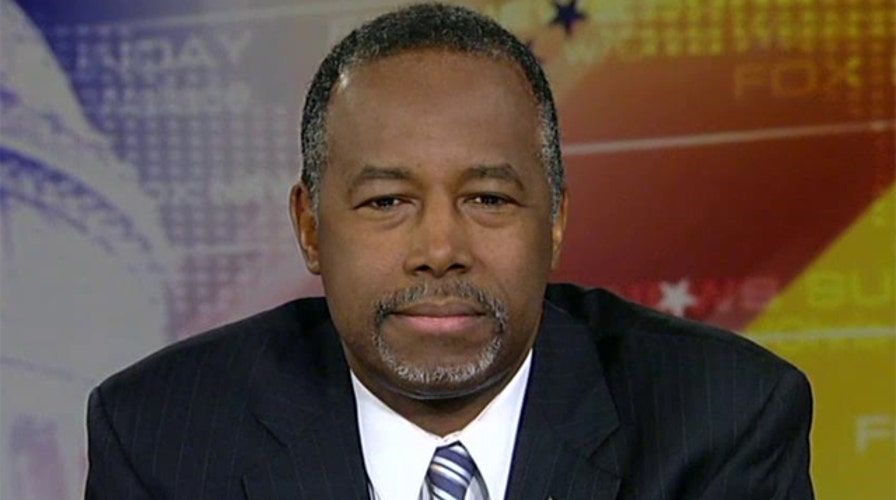Can Dr. Ben Carson emerge from crowded GOP field?
Republican presidential candidate on 'Fox News Sunday'
As 2016 presidential hopefuls reach out to the country’s vast middle class to win their votes and the White House, Republican candidate Ben Carson is making a personal effort to connect with America’s poor and lower-income families.
Carson, a retired neurosurgeon raised in poverty, on Sunday defended his flat-tax proposal against criticism that it would overburden the poor, saying that notion is “condescending.”
“I grew up very poor,” he told “Fox News Sunday.” “Poor people have pride.”
He also disagreed with the argument that his plan would result in lower-income families paying a tax of 15 to 20 percent, saying the flat-tax is just part of an overall plan that includes putting trillions in federal coffers by closing tax loopholes.
Carson also turned questions about his lack of political experience into a message for Americans who face long odds for success.
“My life has been so full of people telling me what I couldn’t do that I would be more concerned if people told me I could do it,” said Carson, citing his rise through the military’s Reserve Officers' Training Corps program and his leadership of surgical teams and a national scholarship program.
“There’s real life experience, and there’s politics,” said Carson, a first-time candidate, in an apparent reference to career politicians. “There are some good people in the political arena, but I’m not sure that they actually, in many cases, understand real life.”
Carson, an African-American who became a conservative star in part by being critical of President Obama, also defended earlier comments that suggested ObamaCare was like slavery, saying the president’s signature health care law makes Americans "subservient to the government" and "is about control."
“ObamaCare fundamentally changes the relationship between the people and the government,” he told "Fox News Sunday." “The government is supposed to respond to the will of the people, not dictate to the people what they are doing. And with this program, we’re allowing that whole paradigm to be switched around.”
Carson also said the United States should rethink the notion that a president must enforce laws the Supreme Court declares constitutional.
"We need to discuss" the court's long-held power to review laws passed by Congress," he said.
That authority was established in the 1803 landmark case Marbury v. Madison.
When asked whether the executive branch is obligated to enforce laws that the Supreme Court declares constitutional, Carson said, "We need to get into a discussion of this because it has changed from the original intent."
Carson has said a president is obliged to carry out laws passed by Congress, but not what he called "judicial laws" that emanate from courts.
And he said he would not rule out military force against Russia, but that it should be used only if the United States' safety were clearly at risk.
"I would, obviously, do that in consultation with very competent generals and people who are more knowledgeable in that area than I would be," said Carson, who has called Russian President Vladimir Putin a bully. "But, clearly, if the interest and the existence and the safety of the people of the United States was at stake -- and that was the only way to protect them -- of course, I would do whatever was necessary."
The Associated Press contributed to this report.





